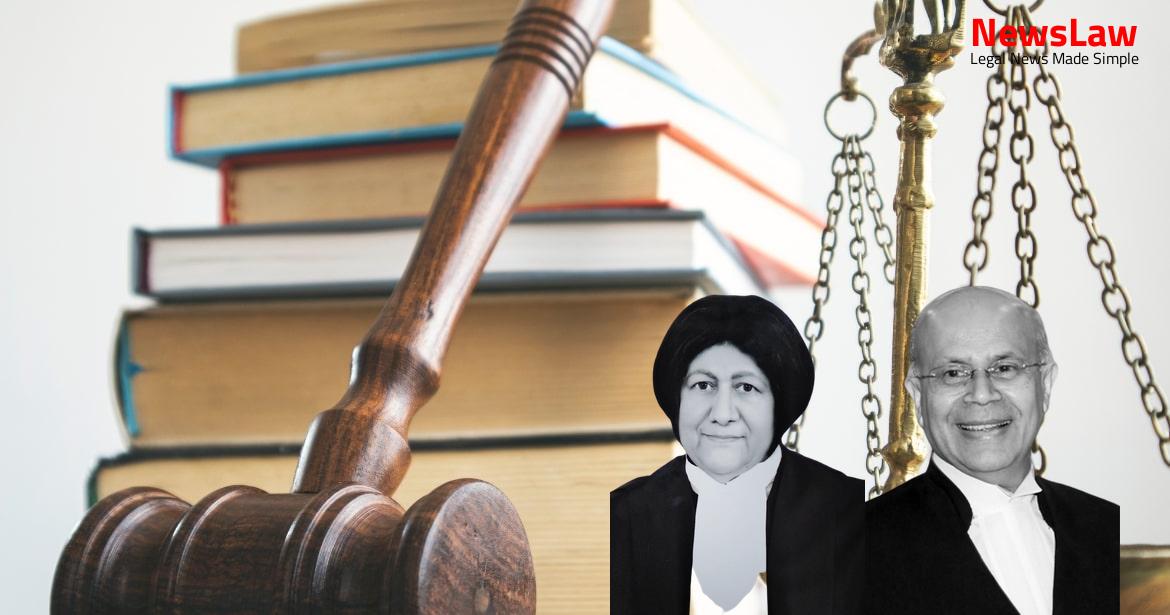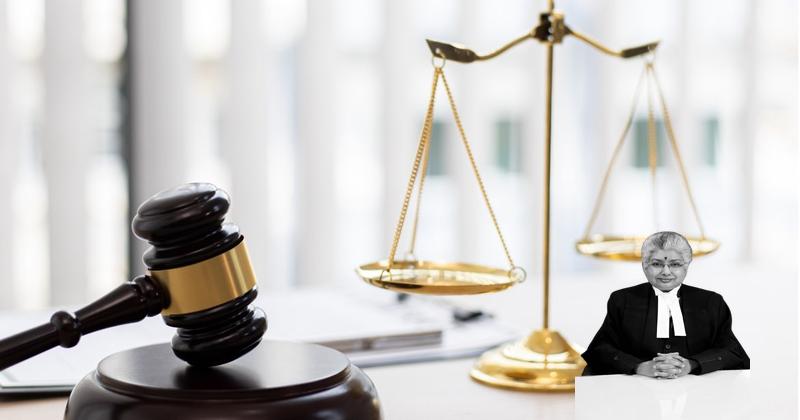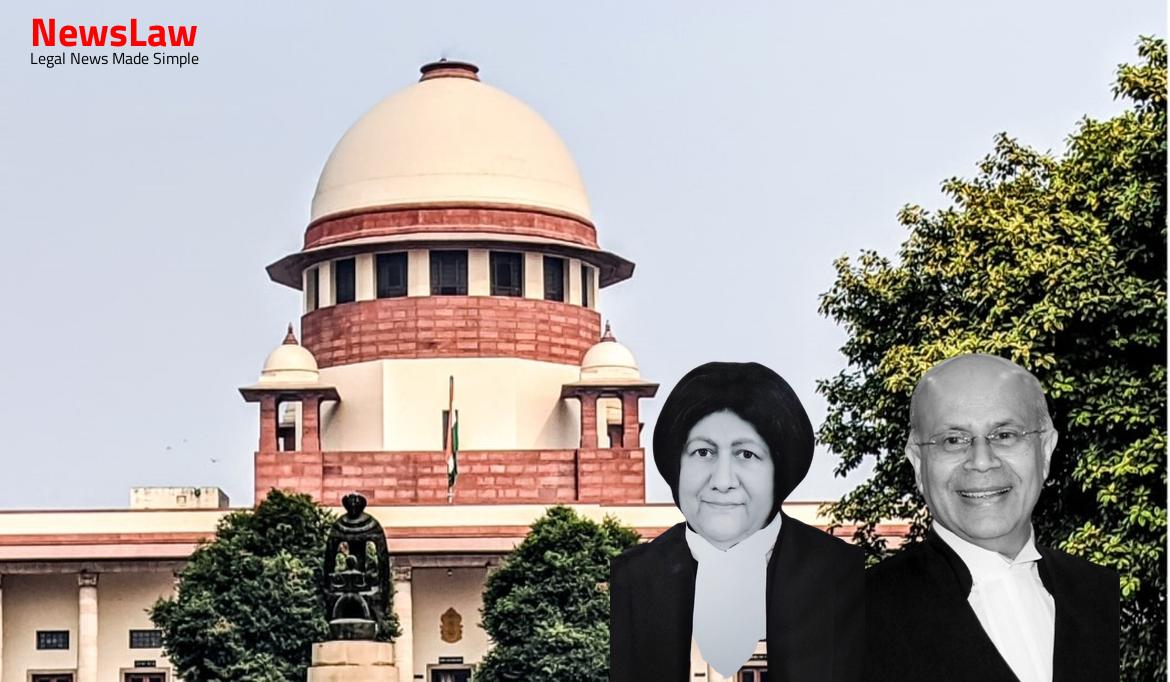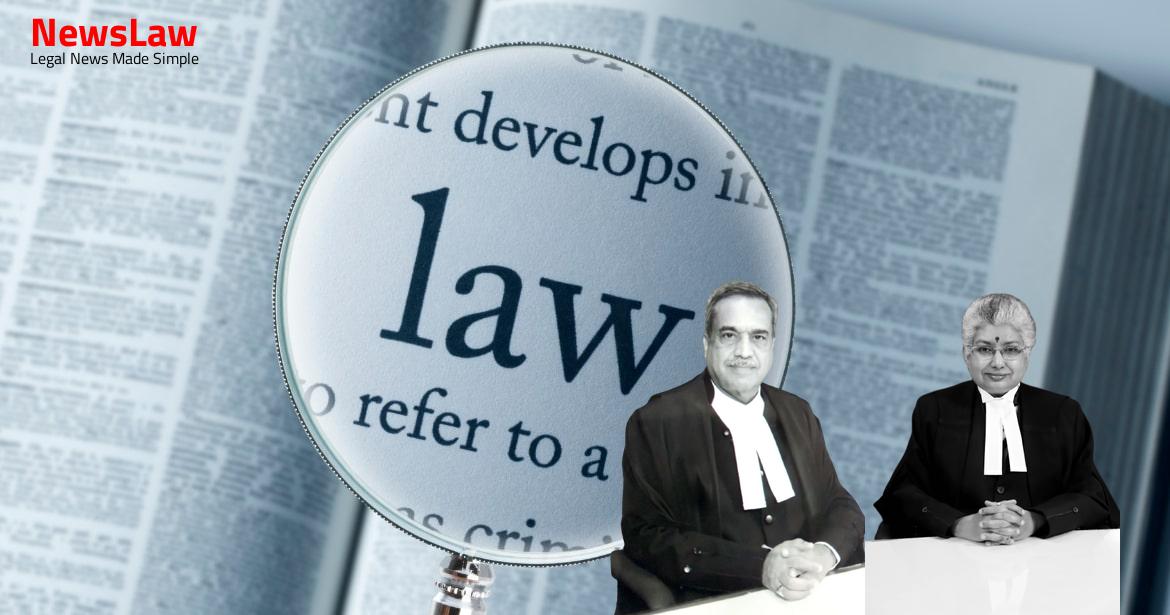Explore a detailed examination of a legal case revolving around a disputed land sale, focusing on the court’s meticulous legal analysis and interpretations. Discover the intricate details of the case’s progression and the court’s application of legal principles to navigate the complexities of the dispute. Stay tuned for insights into specific performance, party obligations, and judicial reasoning in this compelling legal saga.
Facts
- The Vendor filed an appeal in the High Court against the judgment and decree in the suit for specific performance.
- The Vendee represented that there was no need for clearance from Pratap Reddy.
- The Vendee tried to interfere with Pratap Reddy’s possession of 100 sq. yards of the suit land.
- The suit for specific performance allowed relief of specific performance in respect of 200 sq. yards of the suit land.
- The Vendee’s suit for declaration against Pratap Reddy was dismissed for non-joinder.
- The Court held that the Vendee had to pay Rs. 50,000 towards sale consideration.
- Pratap Reddy was added as defendant No.3 in the suit at a later stage.
- Pratap Reddy filed a suit seeking a perpetual injunction against the Vendee for interfering with his possession.
- The Vendor informed the Vendee about the oral agreement with Pratap Reddy.
- A registered deed of conveyance for 100 sq. yards was executed in favor of Pratap Reddy.
- The High Court dismissed the appeals by the Vendee and the Vendor, confirming the Trial Court’s judgment and decree.
- The Vendee paid Rs.40,000 under Ex.A1 and Rs.5,000 under Ex.A3.
- Trial Court held Vendee liable to pay a further sum of Rs.5,000 to the Vendor.
- Common judgment and decree dated 30th March, 1994, disposed of all three suits.
Also Read: Challenging Conviction: Legal Analysis Spotlight
Issue
- In the suit for declaration filed by the Vendee against Pratap Reddy, the issues framed were regarding non-joinder of parties, entitlement to declaration, entitlement to exemplary costs, breach of contract, and specific performance of the sale agreement.
- An additional issue was framed to determine if Pratap Reddy was a bona fide purchaser of part of the suit land.
- In the suit for injunction filed by Pratap Reddy, the issues framed were related to entitlement to perpetual injunction.
- These issues were crucial in determining the rights and reliefs sought by the parties in the respective suits.
Also Read: Interplay of Limitation Act and IBC in Time-Barred Application Case
Arguments
- Mr. Radhakrishnan argued that the purported sale agreement of the Vendor with Pratap Reddy was not genuine.
- Vendee filed a suit against the Vendor and her husband for specific performance of the agreement, without impleading Pratap Reddy as a defendant.
- Mr. Gowtham argued that the agreement for sale of 300 sq. yards of land to the Vendee was incapable of performance as the appellant did not have 300 sq. yards of land.
- Mr. Navare argued that a registered sale deed takes effect over any unregistered document relating to the same property.
- The Court should have set aside the sale deed in favor of Pratap Reddy and directed the Vendor to sell the entire suit property to the Vendee.
- Mr. Navare submitted that the second suit filed by the Vendee was bad for non-joinder of the Vendor, and was also hit by Order II Rule 2.
- The Vendor and her husband contended that the Vendee had not made full payment and hence the agreement was not capable of being specifically enforced.
- Mr. Navare argued that a registered sale deed cannot be declared void in the absence of the Vendor.
- The reliefs claimed by the Vendor in the suit for specific performance were considered barred by limitation against Pratap Reddy.
- Vendor and her husband refused to receive the balance amount of Rs.30,000/- and requested payment by Demand Draft.
- Vendor denies the claim and states that the Demand Draft was not accepted.
- The Vendor’s argument of lack of readiness and willingness by the Vendee is refuted by the initial payment of Rs.40,000/- and Rs.5,000/- to the Vendor’s husband.
- Mr. Radhakrishnan argues for specific performance of the Agreement dated 21.3.1984 for the sale of 300 sq. yards of land to the Vendee.
- Disagreement among lawyers on whether specific performance should be allowed or the conveyance in favor of Pratap Reddy should be declared null and void.
- Mr. Navare argues against the bar of the second suit under Order II Rule 2 of the CPC and emphasizes that accrued rights should not be deprived due to technical defects in the suit.
Also Read: Analysis of Contempt Charges for Breach of Undertaking
Analysis
- Suit for specific performance dismissed due to non-joinder of Vendor as defendant.
- Time-barred suit against Pratap Reddy led to dismissal for non-joinder of Vendor.
- Onus on Vendee to implead Pratap Reddy as a necessary party in a suit for specific performance.
- Error in not impleading Pratap Reddy led to time-barred suit against him.
- Limitation Act 1963 sets the timeline for filing a suit for specific performance.
- Court’s power to add/replace parties post-suit initiation to be exercised fairly under Section 21 of the Limitation Act.
- Vendor’s refusal to perform the agreement evident from legal notice in 1984.
- Vendor’s claim of cancellation of earlier agreement not proved in the written agreement.
- Vendor’s defense of Vendee’s inability/willingness to perform obligations rejected by Trial and High Courts.
- Evidence supports Vendee’s readiness and performance under the agreement.
- Discussion on tendering payments by Vendee according to the contract terms.
- Vendor unfairly transferred part of the property before completing the sale to the Vendee.
- Court discretion exercised in favor of Vendee based on evidence and reasons.
- Rejection of Vendee’s claim by Vendor despite evidence of payment and readiness to complete the transaction.
- Calculation and reduction of damages by Trial Court in lieu of specific performance.
- Legal principles followed – time not essential unless explicitly stated, liberal interpretation of law for justice, and onus of proof on the alleging party.
- Court affirming Vendee’s readiness to perform under the agreement.
- Court’s power to club suits for convenience and efficiency.
- Vendor’s appeal against the decree impacting the progression of the case.
- Interpretation of Section 12 of the Specific Relief Act to promote justice and fairness in directing specific performance.
- Rejection of reversal of judgment under Article 136 of the Constitution, upholding the dismissal of the second suit due to CPC bar.
- Summary of agreements and actions between Vendor, Vendee, and Pratap Reddy in relation to the suit land.
- Importance of raising objections per legislative requirements, and exceptions under Section 12 warranting specific performance in part.
- Specific performance of a part of a contract is generally not allowed by the court.
- Specific performance of a contract shall be enforced subject to the provisions of sub-section (2) of Section 11, Section 14, and Section 16 of the S.R.A.
- Exceptions to the general rule may apply when there is no standard for ascertaining actual damage or when compensation in money for non-performance would not provide adequate relief.
- Objections related to specific performance should be raised at the earliest opportunity before the settlement of issues.
- Section 21 of the CPC also specifies that objections regarding the place of suing should be raised early in the proceedings.
- Suits maintain their separate identity as per Mahalaxmi Coop. Housing Society Ltd. and Ors. v. Ashabhai Atmaram Patel case
- The plea cannot be raised in the Supreme Court if not raised in the High Court, as per Dalip Singh v. Mehar Singh Rathee and Ors. ruling
- In R. A. Oswal v. Deepak Jewellers and Ors., it was held that if the plea of bar under Order II Rule 2 is not taken, the Court should not decide it suo moto
- The High Court’s judgment and order, which upheld the Trial Court’s decision, was found to be free from any errors or defects.
- No grounds were identified that warranted the Supreme Court’s intervention in the matter.
Decision
- The appeals have been dismissed.
- The High Court upheld the judgment of the Trial Court.
- The decision of the High Court is final.
Case Title: B.SANTOSHAMMA. Vs. D.SARALA. (2020 INSC 556)
Case Number: C.A. No.-003574-003574 / 2009



